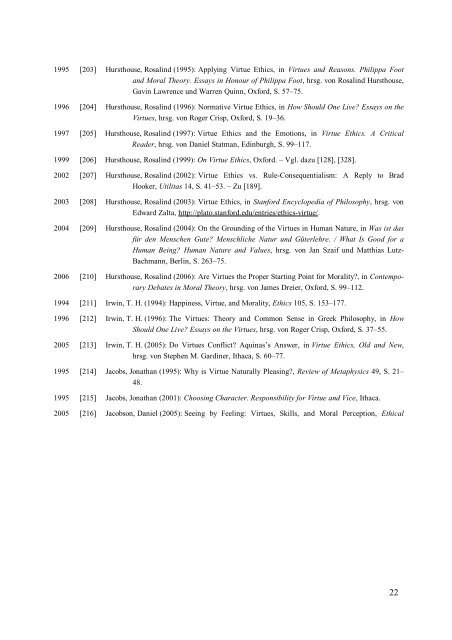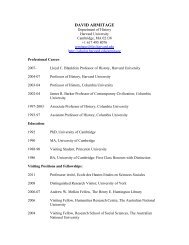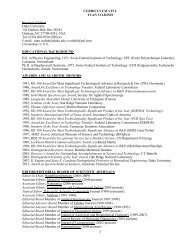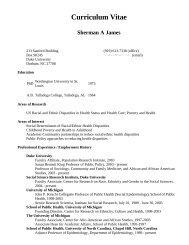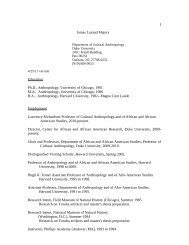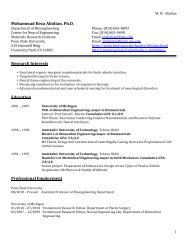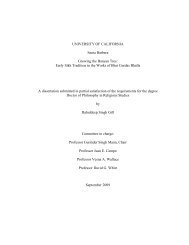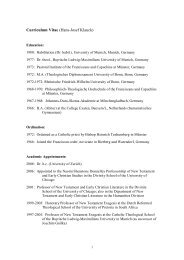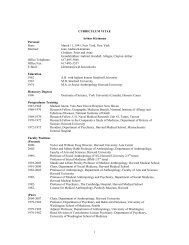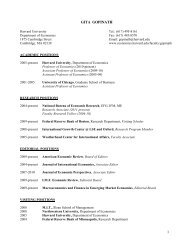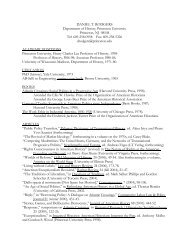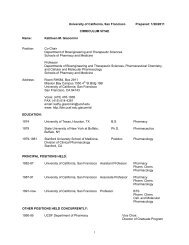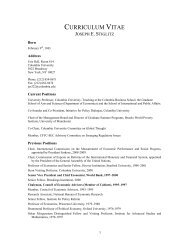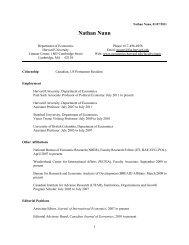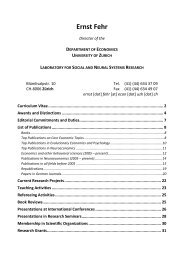1995 [203] Hursthouse, Rosalind (1995): Applying <strong>Virtue</strong> Ethics, in <strong>Virtue</strong>s and Reas<strong>on</strong>s. Philippa Footand Moral Theory. Essays in H<strong>on</strong>our of Philippa Foot, hrsg. v<strong>on</strong> Rosalind Hursthouse,Gavin Lawrence und Warren Quinn, Oxford, S. 57–75.1996 [204] Hursthouse, Rosalind (1996): Normative <strong>Virtue</strong> Ethics, in How Should One Live? Essays <strong>on</strong> the<strong>Virtue</strong>s, hrsg. v<strong>on</strong> Roger Crisp, Oxford, S. 19–36.1997 [205] Hursthouse, Rosalind (1997): <strong>Virtue</strong> Ethics and the Emoti<strong>on</strong>s, in <strong>Virtue</strong> Ethics. A CriticalReader, hrsg. v<strong>on</strong> Daniel Statman, Edinburgh, S. 99–117.1999 [206] Hursthouse, Rosalind (1999): On <strong>Virtue</strong> Ethics, Oxford. – Vgl. dazu [128], [328].2002 [207] Hursthouse, Rosalind (2002): <strong>Virtue</strong> Ethics vs. Rule-C<strong>on</strong>sequentialism: A Reply to BradHooker, Utilitas 14, S. 41–53. – Zu [189].2003 [208] Hursthouse, Rosalind (2003): <strong>Virtue</strong> Ethics, in Stanford Encyclopedia of Philosophy, hrsg. v<strong>on</strong>Edward Zalta, http://plato.stanford.edu/entries/ethics-virtue/.2004 [209] Hursthouse, Rosalind (2004): On the Grounding of the <strong>Virtue</strong>s in Human Nature, in Was ist dasfür den Menschen Gute? Menschliche Natur und Güterlehre. / What Is Good for aHuman Being? Human Nature and Values, hrsg. v<strong>on</strong> Jan Szaif und Matthias Lutz-Bachmann, Berlin, S. 263–75.2006 [210] Hursthouse, Rosalind (2006): Are <strong>Virtue</strong>s the Proper Starting Point for Morality?, in C<strong>on</strong>temporaryDebates in Moral Theory, hrsg. v<strong>on</strong> James Dreier, Oxford, S. 99–112.1994 [211] Irwin, T. H. (1994): Happiness, <strong>Virtue</strong>, and Morality, Ethics 105, S. 153–177.1996 [212] Irwin, T. H. (1996): The <strong>Virtue</strong>s: Theory and Comm<strong>on</strong> Sense in Greek Philosophy, in HowShould One Live? Essays <strong>on</strong> the <strong>Virtue</strong>s, hrsg. v<strong>on</strong> Roger Crisp, Oxford, S. 37–55.2005 [213] Irwin, T. H. (2005): Do <strong>Virtue</strong>s C<strong>on</strong>flict? Aquinas’s Answer, in <strong>Virtue</strong> Ethics, Old and New,hrsg. v<strong>on</strong> Stephen M. Gardiner, Ithaca, S. 60–77.1995 [214] Jacobs, J<strong>on</strong>athan (1995): Why is <strong>Virtue</strong> Naturally Pleasing?, Review of Metaphysics 49, S. 21–48.1995 [215] Jacobs, J<strong>on</strong>athan (2001): Choosing Character. Resp<strong>on</strong>sibility for <strong>Virtue</strong> and Vice, Ithaca.2005 [216] Jacobs<strong>on</strong>, Daniel (2005): Seeing by Feeling: <strong>Virtue</strong>s, Skills, and Moral Percepti<strong>on</strong>, Ethical22
Theory and Moral Practice 8, S. 387–409. 492000 [217] Jansen, Lynn A. (2000): The <strong>Virtue</strong>s in Their Place: <strong>Virtue</strong> Ethics in Medicine, TheoreticalMedicine 21, S. 261–76.1998 [218] Jeffries, Vincent (1998): <strong>Virtue</strong> and the Altruistic Pers<strong>on</strong>ality, Sociological Perspectives 41, S.151–166.1997 [219] Jensen, Steven J. (1997): Goods of C<strong>on</strong>sequences and Goods of <strong>Virtue</strong>, Proceedings of theAmerican Catholic Philosophical Associati<strong>on</strong> 71, S. 179–87.2003 [220] Johns<strong>on</strong>, Robert N. (2003): <strong>Virtue</strong> and Right, Ethics 113, S. 810–34. – Dazu: [269], [442].1998 [221] Kagan, Shelly (1998): Normative Ethics, Boulder, S. 204–12 (“<strong>Virtue</strong>s”).2004 [222] Kamtekar, Rachana (2004): Situati<strong>on</strong>ism and <strong>Virtue</strong> Ethics <strong>on</strong> the C<strong>on</strong>tent of Our Character,Ethics 114, S. 458–91.2010 [223] Kamtekar, Rachana (2010): Comments <strong>on</strong> Robert Adams, A Theory of <strong>Virtue</strong>: Excellence inbeing for the Good, Philosophical Studies 148, S. 147–58. – Zu [3]. Dazu: [5].2002 [224] Kawall, Jas<strong>on</strong> (2002): <strong>Virtue</strong> Theory and Ideal Observers, Philosophical Studies 109, S. 197–222. 502009 [225] Kawall, Jas<strong>on</strong> (2009): In Defense of the Primacy of <strong>Virtue</strong>s, Journal of Ethics and SocialPhilosophy 3, Nr. 2, S. 1–21, http://www.jesp.org/. 51495051“Champi<strong>on</strong>s of virtue ethics frequently appeal to moral percepti<strong>on</strong>: the noti<strong>on</strong> that virtuous people can “see”what to do. According to a traditi<strong>on</strong>al account of virtue, the cultivati<strong>on</strong> of proper feeling through imitati<strong>on</strong>and habituati<strong>on</strong> issues in a sensitivity to reas<strong>on</strong>s to act. Thus, we learn to see what to do by coming to feelthe demands of courage, kindness, and the like. But virtue ethics also claims superiority over other theoriesthat adopt a perceptual moral epistemology, such as intuiti<strong>on</strong>ism - which John McDowell criticizes forillicitly “borrow[ing] the epistemological credentials” of percepti<strong>on</strong>. In this paper, I suggest that the mostpromising way for virtue ethics to use perceptual metaphors innocuously is by adopting a skill model ofvirtue, <strong>on</strong> which the virtues are modeled <strong>on</strong> forms of practical know-how. Yet I c<strong>on</strong>tend that this model isdouble-edged for virtue ethics. The skill model belies some central ambiti<strong>on</strong>s and dogmas of the traditi<strong>on</strong>alview, especially its most idealized claims about virtue and the virtuous. While this may be a cost that itschampi<strong>on</strong>s are unprepared to pay, I suggest that virtue ethics would do well to embrace a more realisticmoral psychology and a corresp<strong>on</strong>dingly less sublime c<strong>on</strong>cepti<strong>on</strong> of virtue.”“<strong>Virtue</strong> theorists in ethics often embrace the following characterizati<strong>on</strong> of right acti<strong>on</strong>: An acti<strong>on</strong> is right iffa virtuous agent would perform that acti<strong>on</strong> in like circumstances. Zagzebski offers a parallel virtue-basedaccount of epistemically justified belief. Such proposals are severely flawed because virtuous agents inadverse circumstances, or through lack of knowledge can perform poorly. I propose an alternative virtuebasedaccount according to which an acti<strong>on</strong> is right (a belief is justified) for an agent in a given situati<strong>on</strong> iffan unimpaired, fully-informed virtuous observer would deem the acti<strong>on</strong> to be right (the belief to bejustified).”“In this paper I resp<strong>on</strong>d to a set of basic objecti<strong>on</strong>s often raised against those virtue theories in ethics whichmaintain that moral properties such rightness and goodness (and their corresp<strong>on</strong>ding c<strong>on</strong>cepts) are to beexplained and understood in terms of the virtues or the virtuous. The objecti<strong>on</strong>s all rest <strong>on</strong> a str<strong>on</strong>gly-heldintuiti<strong>on</strong> that the virtues (and the virtuous) simply must be derivative in some way from either right acti<strong>on</strong>sor good states of affairs. My goal is to articulate several distinct, though related, objecti<strong>on</strong>s grounded in this23
- Page 1: Literatur
- Page 4 and 5: national Journal of Management Revi
- Page 6: 53.2010 [39] Battaly, Heather (2010
- Page 9 and 10: 2005 [60] Brady, Michael S. (2005):
- Page 11 and 12: 2008 [72] Calhoun, Cheshire (2008):
- Page 13 and 14: 1998 [93] Cooper, John M. (1998): T
- Page 15 and 16: 2005 [120] Doris, John M. (2005): R
- Page 17 and 18: 1978 [138] Foot, Philippa (1978): V
- Page 19 and 20: 1996 [166] Griffin, James (1996): V
- Page 21: 166-84.1996 [188] Hooker, Brad (199
- Page 25 and 26: Ethics, hrsg. von Patricia H. Werha
- Page 27 and 28: Deutsche Zeitschrift für Philosoph
- Page 29 and 30: 2009 [280] Miller, Christian (2009)
- Page 31 and 32: 2000 [299] Oderberg, David S. (2000
- Page 33 and 34: Moral Education 24, S. 175-184.1997
- Page 35 and 36: Southern Journal of Philosophy 14,
- Page 37 and 38: 1997 [379] Slote, Michael (1997): V
- Page 39 and 40: 2009 [401] Sreenivasan, Gopal (2009
- Page 41 and 42: 2010 [416] Stohr, Karen E. (2010):
- Page 43 and 44: 2008 [441] Tessman, Lisa (2008): Re
- Page 45 and 46: 2009 [457] van Zyl, Liezl (2009): A
- Page 47 and 48: 2006 [475] Webber, Jonathan (2006):
- Page 49 and 50: 2008 [484] White, Richard (2008): R


